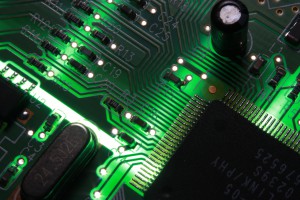Bombmaker’s Guide to Electronics
 As we said in our post calling all authors and artists, we’re looking to showcase the Zombie Survival Crew members, and member, JL Coburn has answered the call.
As we said in our post calling all authors and artists, we’re looking to showcase the Zombie Survival Crew members, and member, JL Coburn has answered the call.
**salutes with crossbow**
Shhhhh!!!! Don’t tell the chief I stole it for this occasion – she’ll blow like a bomb… and let me tell you, it ain’t pretty. So without any further ado, let’s get this thing started.
* * * * *
Guest post by JL Coburn, aka “Bombmaker”
When things go south for the long haul, be it the zombies we plan for or some other disaster, the technological world we have come to love will fade away with it. That does not mean that when the time comes we should shun what we’ve come to depend on. Some of them could end up being just as vital as that multi tool you keep in your pocket.
There are a few factors to consider when it comes down to selecting survival electronics. Portability, power consumption, hardware hacking (sorry Apple fans), and ease of finding a replacement or parts.
- Computers – There are three roads here, a portable custom built system, a laptop/netbook, or running everything from an external hard drive. Linux would be the OS of choice, as it can handle just about any file you find and deal with almost any hardware out today. For those not used to Linux, Ubuntu or a similar distribution is ideal with it’s friendly interface and huge following.
- Personal Computer
- The HTPC (Home Theater Personal Computer) or MicroATX/ITX form factor gives you a huge array of options as far as parts, builds, and hacking options. But they requires an external power source for it and a monitor, making them much less portable but much more powerful.
- Laptop/Netbook
- Portable, but not very hackable. With it’s own monitor and a low power consumption, these are ideal for on the go. Acer Aspire One 533 series is one of the most reliable and least power hungry of what’s out now and can handle Linux, Windows, or even OS X (though you lose trackpad function). Any number of other laptops can fit the bill too, though if you’re willing to deal with the cost, ToughBook Tablets can take more abuse than you typically dole out. Just keep in mind these aren’t they days of doing heavy graphic work from a laptop or watching Hi-def movies. Battery life and portability are the priority.
- Computer Accessories
- External Drive
- If you need to ditch your computer of choice, losing the files as well is a hard blow. Keep them separate and keep them encrypted. And don’t forget install files for the programs you use.
- Cables and Cords
- Network cable, USB cords with various tips (one of each typically), power cord/brick, monitor cable.
- Peripherals (Optional)
- A wireless mouse, solar powered if possible. A solar powered keyboard or one of the flexible, spill proof ones. USB Camera for video logs so the future has a record. IDE/SATA hard drive to USB connection, is a far easier way to browse through a found computer.
- Software
- E-Reader programs are a must.
- A large collection of ebook car and firearm repair manuals, survival guides, farming guides, medical books, translation dictionaries, educational text books, a road atlas and the like will be indispensable.
- Music and videos for entertainment, so we keep our sanity a little bit longer.
- Two Way Radios
- Without cell towers, communication will be in short supply. Pocket size radios with rechargeable batteries will offer an option, albeit limited to a mile or so. More than enough for scouts and patrols. Look for ones with a battery pack, but can also run on AA or AAA batteries to take advantage of the next item.
- Portable Solar Charger
- Goal Zero being the most well known. Their Nomad and Guide series can keep your radios charged and offer AA battery packs for other uses. Sherpa and Extreme can power laptops, lighting, or even a small 12v refrigerator if needed.
- DC to AC Converter
- Maybe a bit bulky, but you are going to find a lot of abandoned cars. Most won’t be worth the time to fix up and are better for parts. All of them have 12v batteries you can easily link to one of these to power any modern appliance for a time.
- Multimeter
- There is no better way to test batteries than this handy device, and it has many more uses for being so cheap. Once a battery falls to 2/3s of it’s rated output (like AA being 1.5v, etc.) then it is as good as dead.
These are just some of the options that will make a life vastly different from what we know, easier. And will give those that may not have skills they need, the information to learn those skills.
For a short term emergency, feel free to refer to Electronics in an Emergency on my personal site.
* * * * *
Thanks again to JL Coburn for stepping up and sharing his views on electronics. To learn more about the Bombmaker check out his information below:
Site | Email | Twitter | Facebook

